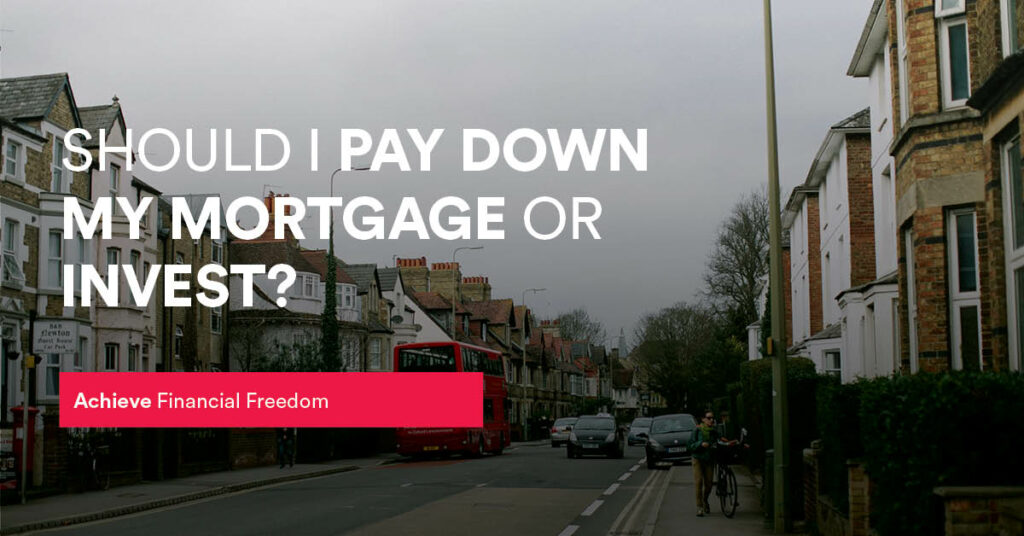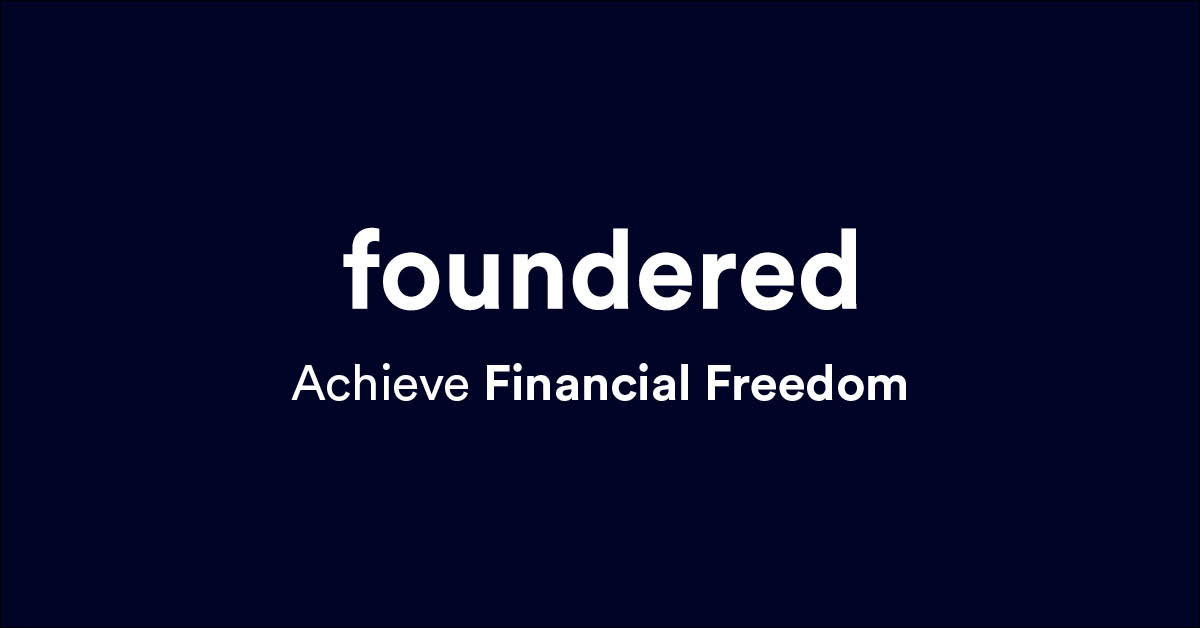One of the most popular questions I receive from readers, friends and family is whether you should pay down your mortgage or invest the money instead. This usually comes after unexpectedly receiving some additional money outside of what they would normally have, such as receiving an inheritance or a workplace bonus.
The answer depends on several factors and it will be 100% dependent on your personal financial position. However, in this article, I’ll deep dive into the reasons you might choose to pay down your mortgage, invest the money or do something else entirely.
Whatever choice you ultimately make, taking action and putting your money to good use is always the right answer.
Pay off your mortgage or invest?
Reasons to pay down your mortgage
- Security
- Decreased monthly outgoings
- Fear of future interest rate increases
Security
There’s a lot to be said knowing that you will always have a roof over your head. This peace of mind is touted as one of the top reasons to pay off your mortgage.
Even if your current lump sum isn’t near enough to pay off your mortgage on its own, consistently focusing on the overpayments will help you pay this down well before the normal term. By paying down your mortgage early, you are reducing the total amount of interest you must pay.
Decreased monthly outgoings
When you put money towards your mortgage in line with the lenders’ overpayment criteria, you will automatically see a decrease in repayment costs.
If your mortgage provider does not allow overpayments, then when it comes to completing your current mortgage contract and remortgage, you will be able to pay the balance to the provider. This will reduce your current mortgage value and you will see your costs come down.
When your mortgage payments decrease, what will you do with the additional cash you’ll have each month? The intelligent thing to do is put this money to work for you in a Stocks and Shares ISA or into another type of investment.
Fear of future interest rate increases
Many readers of the site will be in mortgages agreed before the significant rise in interest rates that occurred throughout 2022 and which looks to continue in 2023. This means that when their current mortgage is due for renewal, they will see a substantial increase in their monthly repayments.
It may also mean that many homeowners could fall into the situation of being unable to afford their mortgage payments. Both literally and in the eyes of mortgage providers who stress test mortgage affordability when making a mortgage offer. Paying down your mortgage removes or reduces the impact interest rate rises will have on your finances.
Factors to consider before paying down your mortgage
- Can you overpay on your mortgage without penalty?
- When is your mortgage up for renewal?
- The opportunity cost of paying off your mortgage vs investing
Can you overpay on your mortgage without penalty?
Does your mortgage provider allow overpayments? The good news is that usually, they do. However, as the conditions of this are different in each mortgage company, check your terms and conditions. It’s common for mortgage overpayments to be capped at a certain percentage, say 10% per year.
When the overpayment threshold is reached, your mortgage provider may impose a penalty for the overpayment.
The question you need to ask is whether your sum of money is greater than the overpayment amount. If that is the case and you do choose to overpay your mortgage, you might also consider investing elsewhere.
When is your mortgage up for renewal?
Is your mortgage up for renewal soon? If so, your mortgage costs could likely jump substantially from your current interest rate to the new rate when you remortgage. You may want to pay down your mortgage, so the increased mortgage cost to your monthly budget isn’t just as high.
If you have a fixed-rate mortgage with a relatively low-interest rate many years from now, it could be financially better for you to hold off overpaying in favour of investing your money and gaining the expected returns. We’re going to compare the financial metrics of both below so that you can start to weigh up the decisions and choose a path that’s best for you.
Risks of paying down your mortgage
There are relatively few risks to paying down your mortgage. Before you consider this, however, ensure you have a fully funded emergency fund of 3-6 times your monthly expenses. The major issue with putting additional money into your mortgage is that you are putting it beyond reach and might need the money in an emergency. An emergency fund mitigates this!
If you are in debt and have high-interest loans, the general best-practice advice would always be to pay this down first before you consider paying down your mortgage or investing.
Investing
There’s no denying that investing is a great alternative to paying down your mortgage. There are advantages and disadvantages that you should consider based on your circumstances.
Advantages of investing over paying down your mortgage
- Investing could provide a return greater than your mortgage rate
- Money that is invested can be accessed in an emergency
Investing could provide a return greater than your mortgage rate
Depending on the type of investments you choose, you may generate a return equal to or greater than your mortgage rate.
If for example you obtain a 5% return on your investments and your interest rate is 5%, then there is no benefit in choosing either investing or paying down your mortgage.
Many investments are likely to provide a return greater than your mortgage interest rate and if this is the case, it would be more financially beneficial to invest.
Money that is invested can be accessed easily
When you invest in most stocks and shares you can sell these at any time you want. The process of both buying and selling investments today is straightforward and can happen almost instantly. Some index funds may take a little bit longer, but certainly, within a few days, you can access your money.
Risks of investing
When paying down your mortgage, you are guaranteed a “return” equal to your interest rate.
When you choose to invest, this will always carry risk. Ultimately, there is the risk that your investment might go down in value.
The choice of investment can include less risky choices, but this often comes with declining rates of investment return.
If you need to access your investment funds in an emergency, you are at the mercy of the markets and the current value of the investments at that time. During the pandemic, many investments decreased by 20-30%. The majority of these have now recovered and much more, but if you need to sell your investments when they are decreased in value, then you crystallise the losses for good.
Where there is a risk, there is a reward!
Financial Coaching Client Case Study: What to do with a £5k bonus
Recently I spoke with a personal financial coaching client and this was the exact question they asked me. We discussed the above advantages and disadvantages of each decision and worked out the following plan. What’s amazing to hear is that since being a client, they are choosing to put their money to work for them instead of spending it all.
Check debt and pay down any debt significantly above your mortgage rate
This client had some small loans with less than £1,200 remaining to pay. Normally my gut reaction is to pay down debt first and foremost. However, the interest on this loan was only 1.25%. At that rate, it doesn’t immediately make paying down low-interest debt first.
If the interest rate had been 10% or greater, there would of course be a different suggestion. To be honest, I’m still a little in shock at this incredibly low loan interest rate. It’s unlikely that they will get a loan at this rate again.
Create a 3-6 month emergency fund
The client had a fully funded emergency fund that they were comfortable with and in this instance adding to that wouldn’t provide any benefit to their circumstances.
Paying down their mortgage
The client is one of the lucky ones among us and locked in a super-low 1.75% mortgage rate in 2021. Fixed for 5 years, so not renewing for another 3 years.
They can overpay up to 10% each year without penalty and the £5,000 would be within this limit.
The decision to pay down the mortgage would guarantee the client a 1.75% return on their bonus money when paying down the mortgage. Not amazing, but guaranteed.
The client was fully aware that the cost of their mortgage payments would rise significantly in the next few years. For this reason, paying down the mortgage would brace and reduce the shock a few years from now. Making a considered effort to reduce the mortgage further, before this change will ensure their keep on budget.
Already an investor?
The reader is currently not an investor and has no experience in this outside of their workplace pension. They had expressed interest in this and would like to educate themselves further.
While investments can decrease in value, the expected annual returns of many index funds, stocks and shares would be greater than the 1.75% cost on the mortgage. If the investments can generate a greater annual return above this, then it would be financially more beneficial for the reader to invest over paying the mortgage down.
What plan did we come up with?
Based on the readers’ situation, it seemed prudent to put some of the money towards paying down the mortgage beginning to build this as a habit. They also decided to put the remaining money towards investments in a tax-efficient manner via a Stocks and Shares ISA.
At the time of mortgage renewal, the client could also choose to withdraw the funds and pay down the mortgage. They could do this with the whole bonus of course, but investing in the short term, which 3 years is considered, does prompt greater risks of swings in value. The investments could go down in value.
Through talking to the client and understanding their money goals, the decision to split the investment and mortgage pay down is not just financial, but also part of forming positive habits of reducing your expenses and increasing your wealth through investing.
The next step in the process is to start supporting the client in their learning of different types of investments they can make within their Stocks and Shares ISA.
Alternatives to investing and paying down your mortgage
Since speaking with the client, a number of high street banks have significantly increased the interest rates within their high-interest savings accounts. As such they have been a viable option over paying down your mortgage. At the minute you could achieve the following interest rates from your bank.
- First Direct – 7.00%
- Lloyds Bank – 6.25%
- Natwest – 6.17%
The guaranteed return would be significantly more beneficial for my client, than the 1.75% they’d get paying down their mortgage. Once the fixed rate is over, they can roll this into a further year if the rates are still high, or take out and pay down their mortgage at that point.
Final thought
The choice to pay down your mortgage or invest isn’t necessarily just a financial decision but is also steeped in emotion.
Weigh up the advantages and challenges you might face with the decision and create a plan you are happy with. Remember it doesn’t have to be one of the other, if you are comfortable with doing so and it fits your financial goals, could you do both?
What I love about people asking this question is that the process of weighing up investing decisions like this and looking at the opportunity cost of each choice is something you can use for the rest of your life.
———
If you’ve read this article and are still unsure of the best course of action, or you want to run your decisions past someone who will be completely objective, I would be delighted to have a 1-2-1 personal financial coaching session. We can walk through the question and while looking at your position decide on an appropriate direction. Click here to book a personal finance coaching session.
Want to continue the discussion? Head over to my Twitter and let me know if you have any thoughts on the article.


